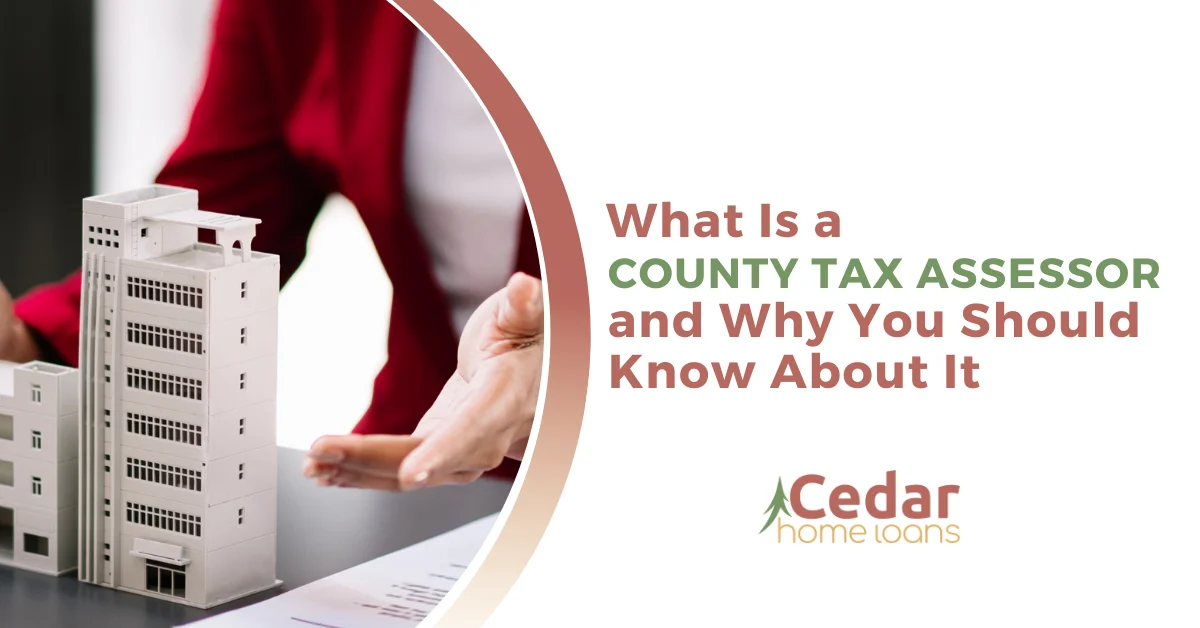Property taxation is a crucial source of revenue for local governments across the country. As such, property owners are required to pay a percentage of their property’s value in taxes each year. These taxes are used to fund public services, such as water and sewer improvements, law enforcement, education, and highway construction.
However, determining the value of a property can be a complex process and often requires the expertise of trained professionals—this is where a county tax assessor comes in.
Let’s take a closer at the main functions of the assessor’s office, how property tax assessments and assessed values are determined in the state and their implications on property owners.
What is a County Tax Assessor?
A county tax assessor is a government official responsible for determining the value of real estate properties in a specific geographic area, usually a county. This includes residential, commercial, and industrial properties. The assessed values are then used to calculate the property taxes that owners must pay each year.
Responsibilities of the Assessor
The primary responsibility of the county tax assessors is to determine the value of real property within their jurisdiction. This involves conducting regular inspections, reviewing property sales data, and collecting data on the local real estate market. They are also responsible for maintaining accurate and up-to-date records of all property in their jurisdiction, including the owner’s name, address, and other relevant information.
County tax assessors work collaboratively with government agencies, owners, and other stakeholders to resolve disputes related to property valuation, including reassessments of a property value or correcting errors in their records.
Assessors Job Description
As it is a highly critical responsibility, the job of a county tax assessor requires a significant amount of expertise and specialized knowledge. Assessors must have a thorough understanding of local real estate markets, including trends in property values and changes in the local economy. They must also be familiar with local zoning and land use regulations, as well as state and federal laws related to property valuation.
Having strong analytical and problem-solving skills is also a must. Assessors usually review data on a large number of properties, identify data trends and anomalies, and use this information to make accurate property valuations.
Tax Assessor Certification
In some states, assessors are required to obtain certification within three years of taking office. This certification process typically involves completing an orientation consisting of three assessment administration courses and five components in home appraisals and farm appraisals in certain agricultural communities.
Appointed assessors are typically required to complete around 12 credits of continuing education each year to ensure that they remain well-informed about the changes in the industry and up-to-date with the latest government practices and regulations.
How Property Tax Assessment Works
The property tax assessment process is complex and involves many factors. Assessors evaluate properties in their respective counties based on their market value. When assessing properties, they consider the value of the land and any improvements made to it, such as building constructions or renovations.
The property tax assessment process is intended to be fair and accurate, but it can be influenced by a variety of factors, including changes in the real estate market, new construction, or renovations made to existing properties. The state legislature can also amend the assessment rate, which can impact the overall property tax bills.
Three Types of Property Tax Assessment
County tax assessors use different approaches and methods depending on the type of properties to provide accurate tax assessments. These methods include:
1. Income Method
With the income method, the property value is estimated based on how much income or profit might be generated on a real estate property. Commercial properties, such as apartments, office buildings, and retail stores, are often assessed through this method. On top of the potential income, tax assessors will also need to consider the property’s maintenance, upkeep, insurance, and other operating expenses.
2. Replacement Method
Another method used to assess the value of specialized or newly built properties is the replacement method. This involves estimating how much the labor, material, and logistics will cost to replace a building or structure. As the cost depends on the current market rates, tax assessors usually take property depreciation into account when evaluating.
3. Sales Comparison Method
The majority of residential properties are assessed using the sales comparison method. In this assessment method, tax assessors will compare properties with similar attributes to determine their value. They will make adjustments only when the property has unique features.
How Property Tax is Calculated
The county assessor is responsible for determining the property’s assessed valuation and calculate the property tax. This is how it generally works:
- The assessor’s office will evaluate the property based on various factors, including market value, property size, and the property’s condition. Enhancements, such as patios and decks, will also be considered.
- The property’s assessed value is then multiplied by the property tax rate, which is set by the state legislature, to calculate the tax bill.
- Property owners are then billed for their property taxes based on this assessed value.
It’s important to note that a property’s assessed value is not the same as the market value of the property. The assessed value is used to determine property tax bills. In contrast, the market value is the amount the property would sell for on the open market.
Key Highlights
County tax assessors play a vital role in the government tax system. They are responsible for determining the value of properties in the county and maintaining accurate and up-to-date tax records.
Property owners should be aware of the role of county tax assessors in determining and understanding the taxable value of their real or personal property. This ensures that their property is assessed fairly and that they are paying the correct amount of taxes. Knowing how property tax assessments work can help them predict how much they will owe and budget their finances accordingly.
Begin making smart choices for your future with Cedar Home Loans.
If you find yourself facing difficulty paying your property taxes, you may want to consider refinancing your mortgage to alleviate your financial burden. Cedar Home Loans is here to help you make informed financial choices for your living situation. We offer Silverthorne home loans and mortgage solutions customized to fit your needs. Contact us for more details.






